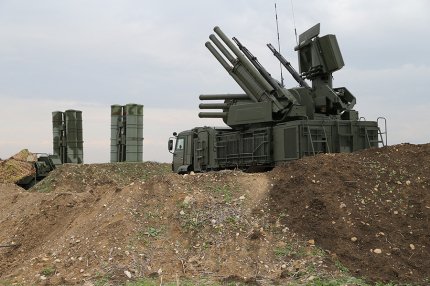Russian military companies, which are under international sanctions, sold Pantsir-S1 air defense systems to Saudi Arabia for $2 billion.
Points of attention
- Saudi Arabia bought billions of dollars worth of weapons, including Pantsir-S1 air defense systems, from Russian companies under international sanctions.
- Cooperating with sanctioned Russian defense companies may lead to sanctions from other countries, such as the United States, affecting Saudi Arabia's diplomatic relations and international standing.
- Purchasing weapons from Russia not only supports the economy of the aggressor country but also serves as a tool of influence and control, impacting global security dynamics.
- The arms deal between Saudi Arabia and sanctioned Russian companies raises concerns about adherence to international standards and sanctions regulations, posing ethical and legal dilemmas.
- Despite the invasion of Ukraine, countries like China, India, Algeria, and Egypt continue to engage in defense cooperation with Russia, highlighting complex geopolitical dynamics in the arms trade.
What is known about arms sales to Saudi Arabia by sanctioned Russian companies?
It is noted that Saudi Arabia received some of the military equipment from Russian companies in 2023, at the height of the criminal war against Ukraine unleashed by the Kremlin.
In an investigation by analysts of the Organized Crime and Corruption Reporting Project and journalists of the Kyiv Independent, citing access to relevant documents, the contract for the sale of Pantsir-S1 air defense systems to Saudi Arabia by Roselektronika was concluded on April 8, 2021 for a period of 5 years.
According to documents obtained by investigative journalists, Russian companies continued to cooperate with Saudi Arabia even after the EU and US imposed sanctions on them.

Under the terms of the contract, Russia is to supply Saudi Arabia with 39 Pantsir-S1 air defense systems, 10 mobile battery command posts, and anti-aircraft missiles.
The first payment for the arms supply was made back in August 2021 in the amount of 326 million euros.
What are the consequences for Saudi Arabia of cooperating with sanctioned Russian defense companies?
The contractual cooperation would not violate any Saudi laws, as the country has not imposed sanctions on Russian firms. However, experts say Saudi individuals and entities risk being subject to U.S. sanctions if they do business with Russian defense companies, the report says.
At the same time, journalists emphasize that the Saudi Ministry of Defense refused to answer a question about whether cooperation with Russian defense companies under sanctions continues.
As Anna Borshchevskaya, a senior fellow at the Washington Institute for Near East Policy, notes, such Russian arms sales not only support the economy of the aggressor country, but also have diplomatic significance.
"Russia views arms sales as another tool of state control. It's a tactic, a tool of influence from the Russian perspective," explains Borshchevskaya.
The documents show that, along with Saudi Arabia, countries such as China, India, Algeria, and Egypt continued to purchase weapons from Russia after the full-scale invasion of Ukraine.







